Related Research Articles
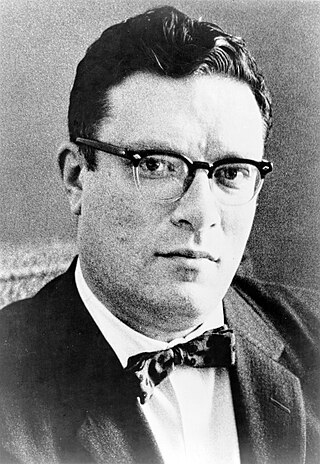
Isaac Asimov was an American writer and professor of biochemistry at Boston University. During his lifetime, Asimov was considered one of the "Big Three" science fiction writers, along with Robert A. Heinlein and Arthur C. Clarke. A prolific writer, he wrote or edited more than 500 books. He also wrote an estimated 90,000 letters and postcards. Best known for his hard science fiction, Asimov also wrote mysteries and fantasy, as well as popular science and other non-fiction.
The Black Widowers is a fictional men-only dining club created by Isaac Asimov for a series of sixty-six mystery stories that he started writing in 1971. Most of the stories were first published in Ellery Queen's Mystery Magazine, though a few first appeared in Fantasy & Science Fiction, Isaac Asimov's Science Fiction Magazine, and the various book collections into which the stories were eventually gathered.
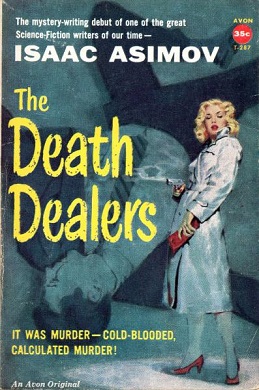
The Death Dealers is a 1958 mystery novel by American writer Isaac Asimov. It is about a university professor whose research student dies while conducting an experiment. The professor attempts to determine if the death was accident, suicide or murder.
Douglass Residential College is a non-degree-granting program established in 2007 and open to female undergraduate students at any of the degree-granting schools of Rutgers University-New Brunswick. It replaced the liberal arts degree-granting Douglass College which had been opened in 1918. Douglass, originally named New Jersey College for Women, was renamed in 1955 after its founder and first dean, Mabel Smith Douglass.
Gilbert Cant was a London-born American journalist.
The Trap Door Spiders are a literary male-only eating, drinking, and arguing society in New York City, with a membership historically composed of notable science fiction personalities. The name is a reference to the reclusive habits of the trapdoor spider, which when it enters its burrow pulls the hatch shut behind it.
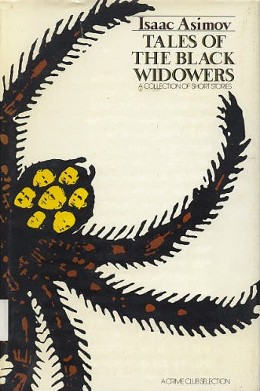
Tales of the Black Widowers is a collection of mystery short stories by American author Isaac Asimov, featuring his fictional club of mystery solvers, the Black Widowers. It was first published in hardcover by Doubleday in June 1974, and in paperback by the Fawcett Crest imprint of Ballantine Books in August 1976. The first British edition was issued by Panther in 1976. The book has also been translated into German and French.
Banquets of the Black Widowers is a collection of mystery short stories by American writer Isaac Asimov featuring his fictional club of mystery solvers, the Black Widowers. It was first published in hardcover by Doubleday in September 1984, and in paperback by the Fawcett Crest imprint of Ballantine Books in June 1986. The first British edition was issued by Grafton in August 1986.

Casebook of the Black Widowers is a collection of mystery short stories by American author Isaac Asimov, featuring his fictional club of mystery solvers, the Black Widowers. It was first published in hardcover by Doubleday in January 1980 and in paperback by the Fawcett Crest imprint of Ballantine Books in March 1981.

More Tales of the Black Widowers is a collection of mystery short stories by American author Isaac Asimov, featuring his fictional club of mystery solvers, the Black Widowers. It was first published in hardcover by Doubleday in October 1976, and in paperback by the Fawcett Crest imprint of Ballantine Books in November 1977. The first British edition was issued by Gollancz in April 1977.
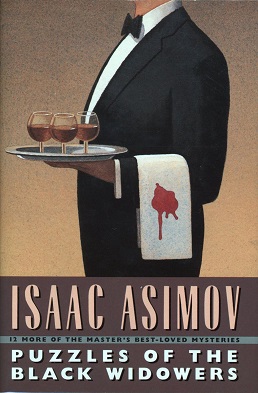
Puzzles of the Black Widowers is a collection of mystery short stories by American author Isaac Asimov, featuring his fictional club of mystery solvers, the Black Widowers. It was first published in hardcover by Doubleday in January 1990, and in paperback by Bantam Books the same year. The first British edition was issued in hardcover by Doubleday (UK) in April 1990, and the first British paperback edition by Bantam UK in April 1991.

The Return of the Black Widowers is a collection of short mystery stories by American writer Isaac Asimov, featuring his fictional club of mystery solvers, the Black Widowers. It was first published in hardcover by Carroll & Graf in December 2003, and in trade paperback by the same publisher in November 2005.

The Union Club Mysteries is a collection of mystery short stories by American author Isaac Asimov featuring his fictional mystery solver Griswold. It was first published in hardcover by Doubleday in 1983 and in paperback by the Fawcett Crest imprint of Ballantine Books in 1985.
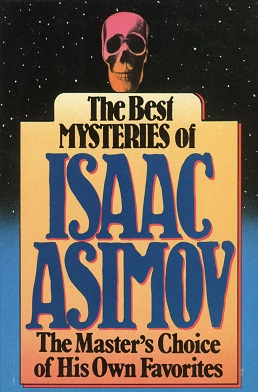
The Best Mysteries of Isaac Asimov is a collection of mystery short stories by American author Isaac Asimov. It was first published in hardcover by Doubleday in 1986, and in paperback by the Fawcett Crest imprint of Ballantine Books in September 1987.
"The Acquisitive Chuckle" is a mystery short story by American writer Isaac Asimov in 1971, first published in the January 1972 issue of Ellery Queen's Mystery Magazine. He originally called it "The Chuckle", but the magazine's title was kept in subsequent uses of the story. It was the first of Asimov's stories about the Black Widowers, an eccentric group of men who met once a month. The story is based loosely upon the Trap Door Spiders, a stag-club of which Asimov was a member.
"Sixty Million Trillion Combinations" is a short mystery story by American writer Isaac Asimov. It was first published in the May 5, 1980, issue of Ellery Queen's Mystery Magazine under the title "64 Million Trillion Combinations," and reprinted in Banquets of the Black Widowers (1984) and The Return of the Black Widowers (2003). Asimov originally entitled it "Fourteen Letters", but a variant of the magazine's title was used in subsequent publications of the story. The story is one of a collection of short mysteries whose characters are based loosely upon the Trap Door Spiders, a stag-club of which Asimov was a member.
"The Ultimate Crime" is a short story by Isaac Asimov, dealing with a minor aspect of one of the Sherlock Holmes stories of Sir Arthur Conan Doyle. It is the 24th of Asimov's Black Widowers mystery stories, and it appeared in his anthology More Tales of the Black Widowers, which collects the second dozen stories of the series. It was written specially for that book. It subsequently appeared again in Sherlock Holmes Through Time and Space, an anthology of stories written by different authors and co-edited by Asimov, and Another Round at the Spaceport Bar.

Theodore Cohen was an American organic chemist and chemistry professor at University of Pittsburgh. He is known for his research on organic chemistry, and particularly on organosulfur compounds, on organometallic chemistry, and on the synthesis of phenols.
Truth to Tell is a 1972 short story by Isaac Asimov. It is one of Asimov's series of stories about the Black Widowers, a gentlemen's dining club that meets monthly to solve mysteries and puzzles. It was first published in the October 1972 issue of Ellery Queen's Mystery Magazine under the title "The Man Who Never Told A Lie", and was included in the 1974 collection Tales of the Black Widowers.
Depending on the counting convention used, and including all titles, charts, and edited collections, there may be currently over 500 books in Isaac Asimov's bibliography—as well as his individual short stories, individual essays, and criticism. For his 100th, 200th, and 300th books, Asimov published Opus 100 (1969), Opus 200 (1979), and Opus 300 (1984), celebrating his writing.
References
- ↑ Many of the details on this webpage are confirmed on Isaac Asimov's author page, which is here (link), accessed July 21st 2014.
- ↑ Asimov 1994, I. Asimov, chapter "120. The Trap Door Spiders".